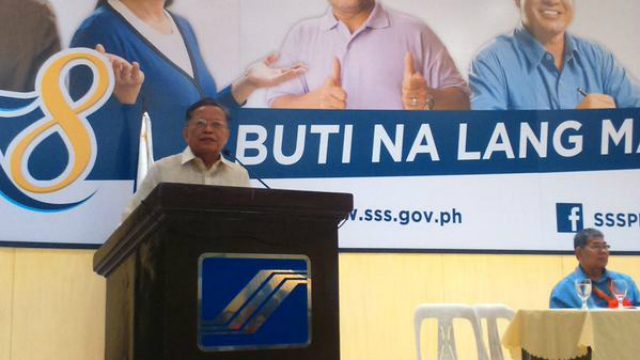SUMMARY
This is AI generated summarization, which may have errors. For context, always refer to the full article.

MANILA, Philippines – The issue of amending the 1987 Constitution must be included as a topic during organized debates between presidential contenders in the 2016 polls, a former magistrate said.
Former Chief Justice Reynato Puno said candidates owe it to the people to explain their stance on a possible constitutional change, including allowing federalism to replace the presidential unitary system the country has.
“Itong pagbabago ng Konstitusyon ay dapat maging subject ng presidential debate. Dapat malaman natin kung ano’ng tayo nila,” he told Rappler on the sidelines of a labor summit on Tuesday, October 6. (Changing the Constitution must be a subject in presidantial debate. We need to know their stand.)
He also urged the Commission on Elections (Comelec) to include the issue in any such presidential debate it will organize among 2016 candidates.
The election commission announced on September 10 that it had formed a technical working group to plan the conduct of “multimedia” presidential debates in each of the country’s 3 major islands.
The Malacañang-backed plan seeks to create a platform-based discussion among the candidates, challenging the largely personality-based electoral races that prevail in Philippine politics.
The last Comelec-organized presidential debate was held in 1992.
Socio-economic rights
In his speech during Tuesday’s Informal Labor Summit for System Change, Puno argued that many of the problems that the country’s poor endure, including social protection issues, emanate from the 1986 Constitution.
The charter, he said, allows for the concentration of power with the elites and political dynasties. He said such leaders are almost always never pro-poor or pro-masses.
“Mabibilang lang natin ang mga lider na nanggaling sa lipin ng mga mahihirap, mga matatawag nating batang obrero,” he said. (We can count the number of leaders who come from the poor, who we can call working children.)
Puno suggested a shift to a parliamentary system. Conrado Generoso of the newly formed group Bagong Sistema, Bagong Pag-asa (New System, New Hope/BSBP) explained that parties with ideals that align with each other can group together and elect a prime minister.
These unified parties can, in turn, better protect the interests of constituents they seek to represent.
To a crowd of mostly urban poor, Puno explained that socio-economic rights unlike civil and political rights cannot be legally demanded from the government by the people under the present Constitution.
He added that there can only be genuine equality when people can resort to legal means to demand from the government their socio-economic rights including housing and education.
Puno said this legal lack under the 1987 Consti where people can’t demand their socio-economic rights causes generational poverty.
Referendum by 2016
Puno is among the men behind BSBP, a non-partisan movement that is pushing for a referendum at the same time as the 2016 national elections. They want voters to vote on whether they want Congress to call for a constitutional convention or con-con.
The group has conducted a series of summits nationwide to inform students, laborers, and members of the informal sector about the benefits of shifting from a unitary presidential system to a parliamentary system.
The group has also gained the support of an undisclosed number of legislators, with Mountain Province Representative Maximo Dalog filing a resolution that calls for the referendum.
“In order to resolve the issue on whether or to to amend or revise the Constitution, there is a need to consult the people directly by ay of referendum and let their sovereign will prevail,” reads House Resolution 2384.
The resolution proposes “that a national referendum be held simultaneous with the national elections on May 9, 2016 for the purpose of asking the electorate the following question: Do you want the 17th Congress to, within 90 days from the opening of the session, call for a constitutional convention that will be composed of elected and appointed delegates to propose amendments to, or revisions of, the 1987 Constitution?” – Rappler.com
Add a comment
How does this make you feel?
There are no comments yet. Add your comment to start the conversation.